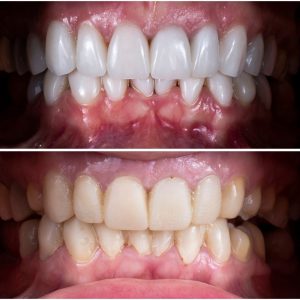If you’re a new parent, you’ve probably heard about the “7/4 rule for teeth” and wondered what it means. Simply put, this rule helps estimate when your child’s baby teeth will erupt. According to the 7/4 rule, starting around 7 months of age, your child will get about 4 new teeth every 4 months until all 20 primary (baby) teeth come in by age 2½ to 3 years.
At Dental Theory in Brandon, FL, Dr. Priyanka Karapasha—a board-certified pediatric dentist—helps parents understand each stage of their child’s dental development. From the first tooth to full smiles, Dr. Pri provides gentle, expert care to keep your child’s teeth healthy from the very beginning.
Explaining the 7/4 Rule for Teeth
The 7/4 rule is a helpful guideline, not an exact timeline. It’s based on averages that give parents a general sense of when teeth will appear. Every child is unique, but this rule provides a simple way to monitor growth and plan for early dental visits.
How the 7/4 Rule Works
Here’s how the 7/4 rule breaks down:
- At 7 months old – the first teeth (usually the lower front incisors) start to erupt.
- By 11 months old – about 4 teeth are typically visible.
- At 15 months old – most children have around 8 teeth.
- By 19 months old – about 12 teeth may be present.
- At 23 months old – many have 16 teeth.
- By 27–30 months old – most toddlers have all 20 primary teeth.
Keep in mind that some children may get teeth earlier or later than these averages, and that’s completely normal. Genetics, nutrition, and overall health can all influence when teeth erupt.
Typical Order of Tooth Eruption
While the timing may vary, baby teeth generally come in this order:
- Lower central incisors (bottom front teeth)
- Upper central incisors
- Upper and lower lateral incisors
- First molars
- Canines (cuspids)
- Second molars
By age 3, most children have a complete set of 20 primary teeth—ready to guide the growth of permanent teeth later in childhood.
Why Baby Teeth Matter So Much
Many parents are surprised to learn that baby teeth are just as important as adult teeth. They play a vital role in speech development, chewing, and guiding permanent teeth into proper alignment. That’s why regular dental visits from an early age are essential for long-term oral health.
Healthy Baby Teeth = Healthy Adult Smiles
Baby teeth create the foundation for your child’s lifelong smile. If they’re lost too early due to decay or injury, it can affect how permanent teeth grow in. Dr. Pri emphasizes preventive care and education to help families protect baby teeth from cavities and damage.
Preventing Early Childhood Cavities
Tooth decay can start soon after the first tooth erupts. Common causes include frequent sugary drinks, prolonged bottle use, and lack of regular cleaning. Dr. Pri teaches parents how to clean baby teeth, avoid “bottle rot,” and establish healthy habits that keep smiles strong.
When to Schedule Your Child’s First Dental Visit
Following the 7/4 rule for teeth can also guide you on when to see a pediatric dentist. The American Academy of Pediatric Dentistry recommends scheduling your child’s first visit by their first birthday or within six months after the first tooth appears. That means most families should book an appointment between 6 and 12 months of age.
Why Early Visits Are So Important
Starting dental care early helps children feel comfortable and confident about visiting the dentist. It also gives parents the opportunity to ask questions, learn proper brushing techniques, and receive personalized advice for their child’s oral development. Early detection of issues can prevent more serious problems later.
What Happens at the First Appointment
During your baby’s first visit, Dr. Pri will:
- Gently examine your child’s mouth, gums, and teeth
- Check for signs of decay or developmental issues
- Discuss teething, pacifiers, and thumb-sucking habits
- Provide brushing and diet tips
- Make the experience fun and relaxing for your child
These visits help establish Dental Theory as your child’s “dental home,” ensuring continuity of care as they grow.
Signs Your Baby’s Teeth Are Coming In
Teething can be an exciting milestone—but it can also bring some discomfort. Common signs of teething include:
- Mild fussiness or irritability
- Increased drooling
- Chewing on fingers or toys
- Swollen or tender gums
- Changes in sleep or eating patterns
These symptoms are usually temporary and can be soothed with gentle gum massages, teething rings, or cool washcloths. If your child experiences a fever, rash, or persistent irritability, contact your pediatrician or pediatric dentist for guidance.
Dr. Pri: Brandon’s Pediatric Dentist for Growing Smiles
As the only board-certified pediatric dentist offering in-office sedation in Brandon, FL, Dr. Priyanka Karapasha provides specialized care for children of all ages—including those with special needs or complex medical conditions. She helps families navigate every stage of dental development, from the first tooth to teenage orthodontic care.
Our Pediatric Dental Services Include:
- Preventive Dentistry – Cleanings, exams, and fluoride treatments.
- Sedation Dentistry – Safe, in-office sedation for anxious children.
- Emergency Dental Care – Immediate relief for dental pain or trauma.
- Restorative Care – Fillings, crowns, and other treatments to repair damaged teeth.
Helping Parents Understand Every Stage of Dental Growth
At Dental Theory, we love partnering with parents to make dental care simple, stress-free, and educational. Understanding the 7/4 rule for teeth is just one part of supporting your child’s smile development. Our goal is to help you feel confident at every step—from teething to teen braces.
Tips for Healthy Baby Teeth
- Start brushing as soon as the first tooth appears using a soft-bristled toothbrush and tiny smear of fluoride toothpaste.
- Wipe your baby’s gums after feedings to remove bacteria.
- Avoid putting your child to bed with a bottle containing milk or juice.
- Encourage healthy snacks like fruits, cheese, and water.
- Visit Dr. Pri every six months for preventive checkups.
Schedule Your Child’s First Dental Appointment
If your baby’s first tooth has arrived, it’s time to visit the dentist! Understanding what the 7/4 rule for teeth means is a great first step, but the next is establishing a dental home for your child. At Dental Theory, Dr. Pri provides the gentle, specialized care every little smile deserves.
Call (813) 822-3058 today to schedule your child’s first dental visit, or book online. You can also read our Google Reviews to see why Brandon families trust Dr. Pri for exceptional pediatric dental care.
FAQs
Q: What is the 7/4 rule for teeth?
A: The 7/4 rule is a simple way to estimate when baby teeth erupt. Around 7 months old, most babies start teething, and they typically gain 4 new teeth every 4 months until all 20 baby teeth have come in by age 2½ to 3 years.
Q: Is it normal if my child’s teeth come in earlier or later than the 7/4 rule?
A: Yes, every child develops at their own pace. Some babies get teeth as early as 4 months, while others may not until closer to 12 months. Small variations are perfectly normal.
Q: When should I take my child to the dentist for the first time?
A: Schedule your child’s first dental visit by their first birthday or within 6 months of the first tooth appearing. Early visits allow Dr. Pri to ensure your child’s teeth are healthy and developing correctly.
Q: What can I do to soothe my teething baby?
A: You can gently massage their gums, use a chilled (not frozen) teething ring, and offer extra cuddles. If your baby seems very uncomfortable, contact your pediatrician or Dr. Pri for advice.
Q: Are baby teeth really that important?
A: Absolutely. Baby teeth help with speech, eating, and guiding permanent teeth into place. Keeping them healthy sets the stage for strong, beautiful smiles in the future.







